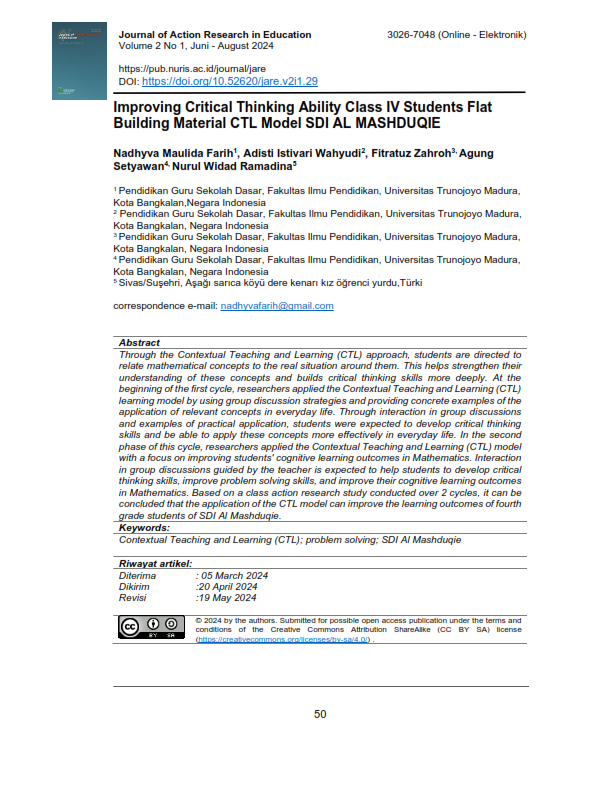Improving Critical Thinking Ability Class IV Students Flat Building Material CTL Model SDI Al Mashduqie
DOI:
https://doi.org/10.52620/jare.v2i1.29Keywords:
Contextual Teaching and Learning (CTL), Problem solving, SDI Al MashduqieAbstract
Through the Contextual Teaching and Learning (CTL) approach, students are directed to relate mathematical concepts to the real situation around them. This helps strengthen their understanding of these concepts and builds critical thinking skills more deeply. At the beginning of the first cycle, researchers applied the Contextual Teaching and Learning (CTL) learning model by using group discussion strategies and providing concrete examples of the application of relevant concepts in everyday life. Through interaction in group discussions and examples of practical application, students were expected to develop critical thinking skills and be able to apply these concepts more effectively in everyday life. In the second phase of this cycle, researchers applied the Contextual Teaching and Learning (CTL) model with a focus on improving students' cognitive learning outcomes in Mathematics. Interaction in group discussions guided by the teacher is expected to help students to develop critical thinking skills, improve problem solving skills, and improve their cognitive learning outcomes in Mathematics. Based on a class action research study conducted over 2 cycles, it can be concluded that the application of the CTL model can improve the learning outcomes of fourth grade students of SDI Al Mashduqie.
References
Arikunto, S. (2021). Penelitian Tindakan Kelas: Edisi Revisi. Bumi Aksara.
Azizah, A. (2021). Pentingnya Penelitian Tindakan Kelas Bagi Guru dalam Pembelajaran. Auladuna : Jurnal Prodi Pendidikan Guru Madrasah Ibtidaiyah, 3(1), 15–22. https://doi.org/10.36835/au.v3i1.475
Dr. Rita Rahmaniati, M. P. (2024). MODEL -- MODEL PEMBELAJARAN INOVATIF. Uwais Inspirasi Indonesia.
Dra. Yetti Ariani, M. P., Yullys Helsa, M. P., & Ahmad, S. (2020). Model Pembelajaran Inovatif Untuk Pembelajaran Matematika Di Kelas IV Sekolah Dasar. Deepublish.
Edi, F. R. S. (2016). Teori Wawancara Psikodignostik. Penerbit LeutikaPrio.
Ester Reni Sawitri, S. P. (2023). MODEL DISCOVERY LEARNING BERBANTUAN KOMIK UNTUK MENINGKATKAN MINAT DAN HASIL BELAJAR. Uwais Inspirasi Indonesia.
Fahmi Saifuddin, A., & Tika, A. (2024). PENGARUH MODEL PEMBELAJARAN CONTEXTUAL TEACHING AND LEARNING TERHADAP HASIL BELAJAR MATEMATIKA KELAS IV SDN SENDANGMULYO 02. 10(7), 1686–1694.
Hutauruk, J. B. D. A. J. B. (2018). Buku Ajar Matematika Sekolah SMP. Deepublish.
Isrokatun, I., Hanifah, N., Maulana, M., & Suhaebar, I. (2020). Pembelajaran Matematika dan Sains secara Integratif melalui Situation-Based Learning. UPI Sumedang Press.
Kistian, A. (2018). Pengaruh Model Pembelajaran Contextual Teaching and Learning (CTL) terhadap Hasil Belajar Matematika Siswa Kelas IV SD Negeri Langung Kabupaten Aceh Barat. Bina Gogik, 5(2), 13–24.
Maria, S. (2022). Meningkatkan Hasil Belajar Siswa Pada Materi Bangun Datar Menggunakan Model Contextual Teaching and Learning (Ctl). Kelas Pendidikan Dasar & Menengah, 12(1), 19–26.
Masalah, L. B., & Mandala, J. P. (2022). 2995-9226-1-Pb. 7(1), 104–112.
Masniladevi, M. (2017). Keterampilan Berpikir Kritis Menggunakan Model Contextual Teaching and Learaning Di Sekolah Dasar. Jurnal Inovasi Pendidikan Dan Pembelajaran Sekolah Dasar, 1(2), 87–98. https://doi.org/10.24036/jippsd.v1i2.8617
Paskalia Yasinta, Etriana Meirista, & Abdul Rahman Taufik. (2020). Studi Literatur: Peningkatan Kemampuan Berpikir Kritis Matematis Siswa Melalui Pendekatan Contextual Teaching and Learning (CTL). ASIMTOT : Jurnal Kependidikan Matematika, 2(2), 129–138.
Rahmadani, A., Wandini, R. R., Dewi, A., Zairima, E., & Putri, T. D. (2023). Upaya Meningkatkan Berpikir Kritis dan Mengefektifkan Pendekatan Kontekstual dalam Pembelajaran Matematika. Edu Society: Jurnal Pendidikan, Ilmu Sosial Dan Pengabdian Kepada Masyarakat, 2(1), 427–433. https://doi.org/10.56832/edu.v2i1.167
Setiawan, H. R., Bahtiar, A., & Harfiani, R. (2023). Monograf: Metode Role play (Upaya Peningkatan Motivasi dan Hasil Belajar Peserta Didik). umsu press.
Zulmaulida, R., Saputra, E., Munir, M., Zanthy, L. S., Wahnyuni, M., Irham, M., Akmal, N., & others. (2021). Problematika Pembelajaran Matematika. Yayasan Penerbit Muhammad Zaini.




